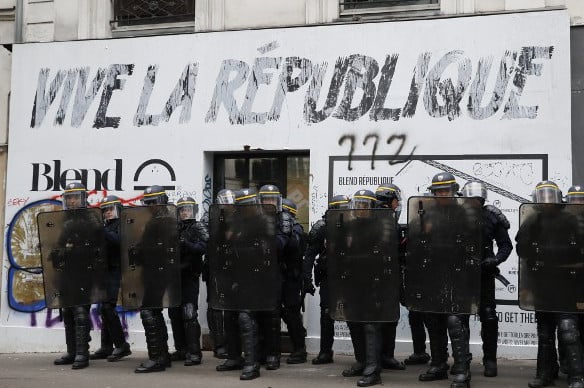Real structural reforms are now a matter of urgency if France wants to boost its flagging economy and cut high unemployment, François Asselin the president of the CGPME organisation representing small and medium businesses, has said.
“We have been promised reform too often in recent years. We’ve talked about what was necessary for years and nothing has ever been done,” said Asselin, seen in the photo below discussing labour reforms with former Prime Minister Manuel Valls.
“The next election will be a real watershed one for France,” warned Asselin.
 (Francois Asselin meets the former PM Manuel Valls and Labour Minister Myriam El-Khomri. AFP)
(Francois Asselin meets the former PM Manuel Valls and Labour Minister Myriam El-Khomri. AFP)
Alexandre Montay, the general delegate of METI, another organisation that represents medium sized businesses, says France has stalled for the last 30 years and that its companies cannot now compete on an international level.
He claims the high payroll taxes in France compared to the rest of Europe and the heavy bureaucracy means French companies are losing out in an ever more competitive world.
“We lost control of our destiny 30 years ago. Now it’s an emergency,” he added.
“Most countries consider their businesses as strategic assets, a key to creating jobs and wealth. But in France, for the last 30 years, governments have considered their businesses simply as contributors to the national solidarity,” Montay said.
“The next presidential election is decisive. We need reforms put in place quickly.”
 (Alexandre Montay. AFP)
(Alexandre Montay. AFP)
In recent days and weeks the line-up for that “watershed” presidential race has become clearer.
Presidential frontrunner, the right wing candidate François Fillon, has promised “to tear the house down and rebuild it” in the same manner Margaret Thatcher did in the UK.
Socialist Manuel Valls stepped down as PM to throw his hat in to the ring accusing Fillon of promoting “the same failed recipes of the 1980s”.
Then there is protectionist Marine Le Pen who wants to pull France out of the EU and restrict globalization and the business-friendly, centrist Emmanuel Macron who wants to unite progressives on the left and the right. More left wing candidates like Arnaud Montebourg and Jean-Luc Mélenchon are also in the running although seen as outsiders.
For whoever triumphs, the CGPME's Asselin spelled out exactly what needs to be done in a country with 10 percent unemployment and minimal economic growth.
“What we need now is real clarity and coherence,” he said. “The labour market is completely blocked because businesses are too scared to recruit. Everything is complicated. The regulations, the high taxes and the red tape are holding us back.
“We now need courageous people who will take tough decisions,” he said.
Asselin’s plea is an old one but he believes the French people are finally ready for change.
“The French are ready. We feel the French need us to tell them exactly what is happening and explain to them the world they are in. We can’t continue with this debt and with all these people out of work,” he said.
 (François Fillon is promising sweeping reforms, but how much will he really get done. AFP)
(François Fillon is promising sweeping reforms, but how much will he really get done. AFP)
Business leaders say it is vital for that economic questions are at the forefront during next year’s election campaign rather than questions of identity or religion which dominated the run up to the first round of the right wing presidential primary – until Nicolas Sarkozy was knocked out.
“Everyone talks about the fracturing of the French society, but what really fractures it is unemployment. A society has far fewer problems if the economy is growing,” said Montay.
The question is are the French willing to make sacrifices so that companies in France can become more competitive? Many will be loath to lose work and health benefits that have built up over decades for what they would see as helping businesses improve their profit margins.
And those cuts could be severe.
Presidential frontrunner François Fillon is promising €110 billion cuts over five years, to raise the legal working week from 35 to 39 hours and to raise the retirement age to 65.
He is targeting France’s generous health system by planning to force the French to buying extra private insurance for everything other than long term or serious illnesses.
 (Fireworks thrown at police during labour reform protests. AFP)
(Fireworks thrown at police during labour reform protests. AFP)
But he’ll face resistance.
A new survey showed 84 percent of French people valued their social security system that covers healthcare and some 79 percent feared it was in danger.
Both business leaders accept that radical change will undoubtedly lead to militant street protests, particularly at the start of the next president’s term.
But Montay stresses France does not have to end up like the United States.
“There are countries like Sweden and Denmark which have a level of social protection but they have managed to keep the competitiveness of their companies by lowering corporation taxes,” he said.
“France will always be closer to the model of Germany and Scandinavia than the United States.
The French may be fond of their welfare state – deemed very generous compared to English speaking countries like the UK and the US, and their 35-hour work week but the CGPME’s Asselin believes most French people now accept things must change.
“The French need to accept certain sacrifices, that are not enormous, for example working 39 hours a week instead of 35. We are not talking about working 39 hours and getting paid for 35, we are talking about putting more money in the pockets of our workers.
“If we don’t make these efforts we risk losing everything,” he said.



 Please whitelist us to continue reading.
Please whitelist us to continue reading.
Member comments